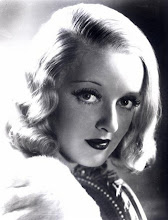I know I said I'd have this up yesterday, but I was sidelined by a fever and all the usual pleasantness that comes with it. If you missed the first half of this post, it's over this way.
There was also a portion of the discussion set aside for questions from the audience. Before you ask, no, I didn't contribute anything -- for one thing, I was in the back of a dark corner to the side of the main theater seating with no chance of being seen, and for another, I would have been much too nervous anyway! However, I did learn a lot from the questions that were asked.
One person asked about blacklisting in the TV industry. Joe Gilford pointed out that his parents were both blacklisted from television, as were a great many others, and that TV blacklisting went on longer and was possibly even nastier than its counterpart in the film industry. Victor Navasky theorized that because television was in its infancy at this time, the effects of the blacklist and the paranoia about what could and could not be said might even be at the root of current standards of decency with regards to what can't be said or shown on TV.
Someone else asked about the aftereffects of the blacklist and whether it still, in a sense, exists today, pointing out that Elia Kazan had been given an honorary Oscar for his body of work, while John Garfield has received no such recognition. In response, Lee Grant read a moving statement from John Garfield's daughter Julie, who had originally intended to be included in the panel but was unable to make it. Julie Garfield wrote about how her father's blacklisting tore apart their lives -- CBS cancelled a deal he'd had with them, ending his career; their home phone lines were tapped; and finally, the FBI tried to make him sign an affidavit accusing his own wife of Communist ties. The harassment ended only when Garfield died of a heart attack at age 39.
The next question took the evening in an unexpected direction. The widow of Budd Schulberg was in the audience, and stood up to defend her late husband's decision to voluntarily name names before HUAC. She asked the panel to consider his rationale, as he had explained it to her, which was that he had been kicked out of the Communist party for wanting to be a writer first and a political activist second; he had also become extremely distressed at the treatment of writers in Stalin's Russia, and, she said, supported the blacklist as a means of fighting what he called the "death list" in the Soviet Union. She was obviously very emotional and seemed to have a hard time making her point, understandably as she only lost her husband a few months ago, but I have to admit that at first I thought her remarks were inappropriate, given that they were directed towards people who had to live with the consequences of the decision that her husband and so many others made to cooperate with HUAC. However, this turned out to be one of the most thought-provoking moments in a night that was riddled with them.
It wasn't the panel's answers to her question that intrigued me; they seemed to be unanimous in their disagreement, as would be expected. However, Lee Grant stopped to commend the woman for having the courage to speak her piece in a room full of people who likely held the opposite point of view, and I found that very insightful. It's so tempting, when looking at any event in history, to treat it like a classical Hollywood film; there's black and there's white, there are good guys and bad guys, and everything's wrapped up neatly at the end. Obviously nothing in real life happens this way. Yes, perhaps it's possible to look back and say who did the right thing and who did not, but isn't investigating why people made the choices they did just as important as recalling what they were? There are no heroes and villains; there are only human people reacting to the circumstances in which they find themselves, and I think those of us who have only textbooks to teach us about these pieces of history can very quickly lose sight of that fact.
I'm finishing this post about two days after I started it, and it's not officially Thanksgiving anymore. However, I'd still like to end on a note of gratitude, because as a student I feel incredibly privileged to have been able to attend this event. The opportunity to hear such a momentous event, not only in film history but in American history, discussed openly by people who lived it is a rare and very valuable one. I learned a great deal, and I sincerely appreciate the efforts put in by everyone responsible for making this event happen.
Sunday, November 29, 2009
Subscribe to:
Post Comments (Atom)



No comments:
Post a Comment